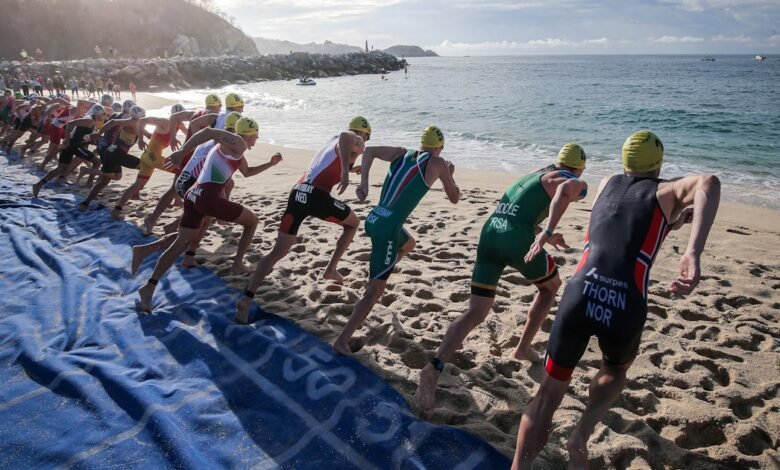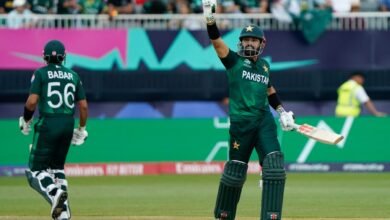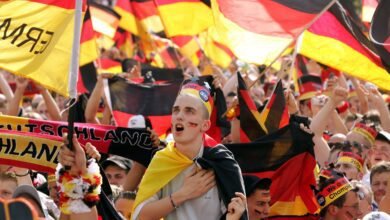How the Samarkand and Huatulco World Cups reshaped the Olympic ranking • World Triathlon

After a mixed relay Olympic qualifier and a World Cup weekend doubleheader, triathlon fans trying to track the various permutations and vagaries of the Olympic rankings may have risked ending the weekend with such a slate of evidence. confused as the best conspiracy theorists.
In the Huatulco and Samarkand races, athletes rose and athletes fell, so in this article, we’ll pick up the pieces and share exactly what you need to know before the final showdown.
The men’s Olympic ranking
In normal discussions about Olympic rankings, we tend to focus on the top 30 (the threshold for sending a third athlete to the Games) or the group of athletes seeking the final spots for individual qualification through the rankings. Here, however, we will start a little differently.
While Richard Murray (NED) achieved a remarkable victory in Huatulco, the Dutch team was more fixated on Mitch Kolkman’s result of the day. The 2023 U23 World Cup medalist entered the weekend with an Olympic ranking of 146th, but to secure the Dutch mixed team relay Olympic berth he had to climb into the top 140. It turns out a 9th place was enough to see him rise to 126th. His rise may not have been as dramatic as some of the others seen in recent times, but it may have been one of the most important.
Further up the rankings, Bence Bicsák (HUN) and Márk Dévay (HUN) took one and two places, respectively, after their performances in Huatulco and Samarkand. They are now 24th and 26th in the Olympic rankings and have essentially secured a third men’s Olympic berth for Hungary, Gabor Faldum in 29th knowing he needs a big result in Cagliari if he is to claim one of them.
Makoto Odakura (JPN) made a valuable gain of four places after finishing 9th in Samarkand. He is now 41st in the Olympic rankings and has gained breathing space over his compatriot Takumi Hojo, who has dropped to 48th. In all likelihood, the higher-ranked of the two will receive Japan’s second men’s Olympic berth behind Kenji Nener.
In yet another national Olympic event, Jonas Schomburg (GER) finally triumphed in the duel against Lasse Nygaard Priester. Schomburg’s bronze medal in Samarkand, his second World Cup medal of the season, made it mathematically impossible for Priester to overtake him in the Olympic rankings and thus Schomburg received the third and final German Olympic berth. Schomburg finished the weekend in 16th place.
Further down the standings, the race for the final spots became ridiculously tight. Tjebbe Kaindl (AUT) and Gasper Riveros (CHI) are in line to occupy the last two men’s spots, 81st and 83rd, respectively. Meanwhile, Gregor Payet (LUX) moved up two places after his performance in Samarkand, occupying 84th place in the rankings and is less than one point behind Riveros. After two years of qualification, 0.71 points separate the two men.
Payet’s hopes may yet be salvaged, as at this time there is no man eligible to claim the New Flag of Oceania spot. The spot will therefore go down in the Olympic rankings to the next highest ranked man, opening the door for the Luxembourg athlete.
The women’s Olympic ranking
One of the most significant moves in the women’s rankings came from Ilaria Zane (ITA). Zane’s 5th place in Samarkand, her fourth top 5 finish at the 2024 World Cups, moves her up two places in the rankings to 26th place. On paper at least, that should be enough to keep it in the top 30 and give Italy a third women’s berth at the Paris Olympics, although the final selection is entirely discretionary.
Alberte Kjær Pedersen (DEN), the winner of the race in Huatulco, moved up eight places to 30th in the rankings. Although she is the only Danish athlete in the top 30, Pedersen’s rise has had a slight impact on yet another race to earn a third spot. Both Noelia Juan (ESP) and Anna Godoy Contreras (ESP) lost ground behind Pedersen after not racing at the weekend. The two Spanish athletes will target WTCS Cagliari as their last chance to score points, but both will have a lot of work ahead of them to reach the top 30.
Another woman to mention is Roksana Slupek (POL). Her 4th place in Samarkand continues her good form and takes her nine places to 75th in the Olympic rankings. This probably won’t be enough to guarantee Olympic qualification, but there is a vital twist. Slupek’s result elevated her to 50th in the world rankings and therefore pole position to fill the European women’s New Flag spot. Both Slupek and her closest rival, Sinem Francisca Tous Servera (TUR), will race at WTCS Cagliari knowing that a great performance could swing the Olympic pendulum either way.
Ultimately, though, when it comes to the women’s Olympic rankings, the biggest action can be found in the hunt for the final spot.
Unlike the men’s field, all five Nova Bandeira women’s spots will be allocated. With that, there are four women who are now looking for one last place.
As things stand, Lisa Peterer (AUT) is the second-to-last woman to rank from 55th in the rankings. She may still be sucked into the battle below, but she will likely be safe. Meanwhile, Petra Kurikova (CZE) finished 15th in Samarkand, moving up two places in the standings to 58th place. She now trails Peterer by less than 170 points. Crucially, Kurikova overtook Erica Hawley (BER).
Hawley is ranked 60th in the rankings, just over 60 points behind Kurikova. Two positions behind, Dominika Jamnicky (CAN) lurks in 62nd place, while Zuzana Michalickova’s (SVK) pupil shows no signs of appearing. The Slovak athlete gained six positions after finishing 7th in Samarkand and occupies 63rd place in the Olympic rankings.
The situation, then, is simple. The four candidates are separated by six positions in the ranking and just 271 points. Hawley may still have the saving grace of a universal place for Bermuda if he loses, a luxury others do not have. Interestingly, all four will race at WTCS Cagliari this weekend and the fight for the final women’s spot in the Olympic rankings will be decided on the final day of qualifying.
When it comes to Olympic qualification, then, the result of this weekend’s WTCS Cagliari exalts some and devastates others, while we have barely scratched the surface of the various Olympic subplots to be traced. The action promises to be nothing short of electric and you can follow all the excitement on TriathlonLive and follow all the narratives on World Triathlon’s social channels.




